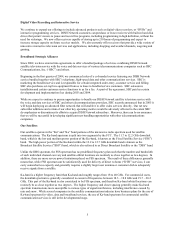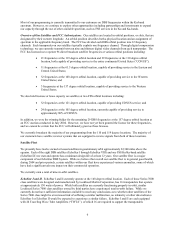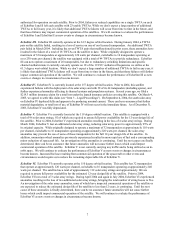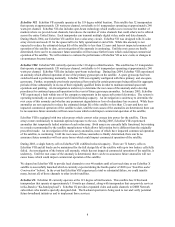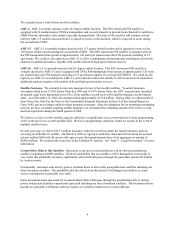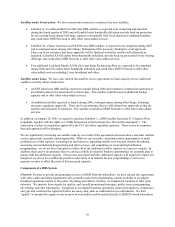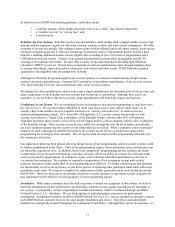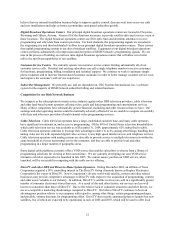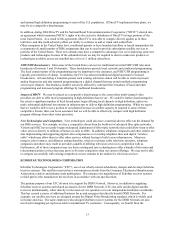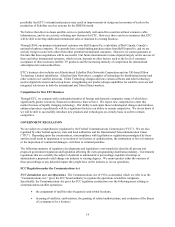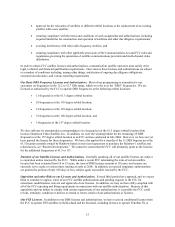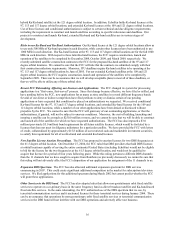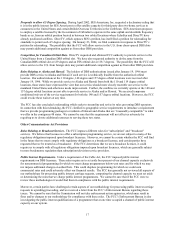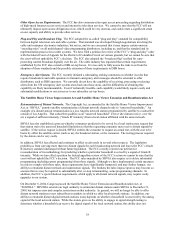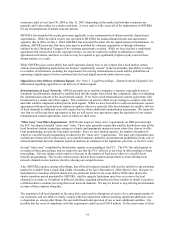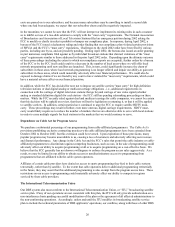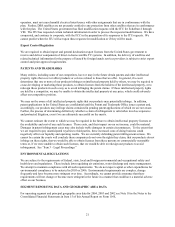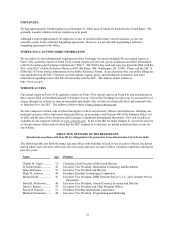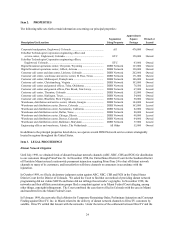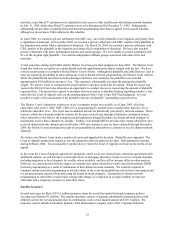Dish Network 2004 Annual Report Download - page 23
Download and view the complete annual report
Please find page 23 of the 2004 Dish Network annual report below. You can navigate through the pages in the report by either clicking on the pages listed below, or by using the keyword search tool below to find specific information within the annual report.15
• approval for the relocation of satellites to different orbital locations or the replacement of an existing
satellite with a new satellite;
• ensuring compliance with the terms and conditions of such assignments and authorizations, including
required timetables for construction and operation of satellites and other due diligence requirements;
• avoiding interference with other radio frequency emitters; and
• ensuring compliance with other applicable provisions of the Communications Act and FCC rules and
regulations governing the operations of satellite communications providers and multi-channel video
distributors.
In order to obtain FCC satellite licenses and authorizations, communication satellite operators must satisfy strict
legal, technical and financial qualification requirements. Once issued, these licenses and authorizations are subject
to a number of conditions including, among other things, satisfaction of ongoing due diligence obligations,
construction milestones, and various reporting requirements.
Our Basic DBS Frequency Licenses and Authorizations. Most of our programming is transmitted to our
customers on frequencies in the 12.2 to 12.7 GHz range, which we refer to as the “DBS” frequencies. We are
licensed or authorized by the FCC to operate DBS frequencies at the following orbital locations:
• 11 frequencies at the 61.5 degree orbital location;
• 29 frequencies at the 110 degree orbital location;
• 21 frequencies at the 119 degree orbital location;
• 32 frequencies at the 148 degree orbital location; and
• 3 frequencies at the 157 degree orbital location.
We also sublease six transponders (corresponding to six frequencies) at the 61.5 degree orbital location from
licensee Dominion Video Satellite, Inc. In addition, we were the winning bidder for the remaining 29 DBS
frequencies at the 157 degree orbital location at an FCC auction conducted in July 2004. However, we have not yet
been granted the license for these frequencies. We have also applied for a transfer of the 11 DBS frequencies at the
61.5 location currently owned by Rainbow based on our recent agreement to purchase the Rainbow 1 satellite and
related assets, see “Recent Developments.” We cannot be certain that the FCC will ultimately grant us the licenses
for the additional frequencies at 61.5 or 157.
Duration of our Satellite Licenses and Authorizations. Generally speaking, all of our satellite licenses are subject
to expiration unless renewed by the FCC. While under a recent FCC rulemaking the term of certain satellite
licenses has been extended from 10 to 15 years, the term of DBS licenses remains at 10 years; our licenses are
currently set to expire at various times starting as early as 2006. In addition, our special temporary authorizations
are granted for periods of only 180 days or less, subject again to possible renewal by the FCC.
Opposition and other Risks to our Licenses and Authorizations. Several third parties have opposed, and we expect
them to continue to oppose, some of our FCC satellite authorizations and pending requests to the FCC for
extensions, modifications, waivers and approvals of our licenses. In addition, we may not have fully complied with
all of the FCC reporting and filing requirements in connection with our satellite authorizations. Because of this
opposition and our failure to comply with certain requirements of our authorizations, it is possible the FCC could
revoke, terminate, condition or decline to extend or renew certain of our authorizations or licenses.
Our FSS Licenses. In addition to our DBS licenses and authorizations, we have received conditional licenses from
the FCC to operate FSS satellites in the Ka-band and the Ku-band, including licenses to operate EchoStar IX (a


